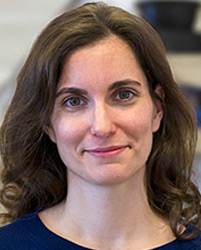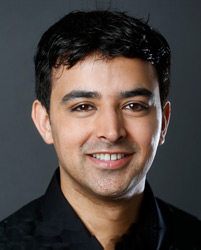
Dafna Bar-Sagi, PhD
Professor, Department of Medicine
NYU Langone Health
The research in Dr. Bar-Sagi’s laboratory focuses on defining the contribution of specific molecular perturbations in GTP-Ras signaling axis to cancer initiation and progression with the ultimate goal of utilizing this information for the development of novel diagnostic and therapeutic strategies. Ongoing projects in the laboratory include the development of cell- and animal-based models to study the role of inflammation in Ras-driven tumorigenesis, the characterization of feedback mechanisms that control the functional output of the Ras signaling axis and the use of chemical biology approaches to identify new modalities for therapeutic targeting.

Adrienne A. Boire, MD, PhD
Neuro-Oncologist
Memorial Sloan Kettering Cancer Center
Dr. Boire's work focuses on metastasis to the central nervous system (CNS), both leptomeningeal and parenchymal metastases. Boire lab employs multiple complementary approaches to identify and target cancer cell adaptations to the challenging microenvironmental constraints posed by the CNS. Dr. Boire is involved in clinical trials that aim to translate laboratory research into therapy for patients with metastasis to the nervous system.

Paul Cohen, MD, PhD
Albert Resnick MD Assistant Professor
The Rockefeller University
Cohen laboratory investigates the molecular origins of metabolic dysfunction related to obesity. Using animal and cellular models and translational approaches in humans, Cohen investigates the transcriptional basis for the harmful and health-protecting effects of fat deposits and the adipocytes they contain in conditions such as hypertension, cardiovascular disease, and cancer. In recent studies, Cohen laboratory adapted a revolutionary three-dimensional tissue imaging system known as iDISCO, to study differences in fat cells metabolism. The new 3D system allowed, for the first time, researchers to examine the architecture of neuronal projections within fat tissue and showed how metabolic signals in fat cells influence nerve growth. These findings highlight the value of 3D imaging as a discovery tool.

John S. Condeelis, PhD
Professor, Department of Surgery
Icahn School of Medicine at Mount Sinai
John Condeelis' research interests are in optical physics, cell biology and biophysics, cancer biology and mouse models of cancer. He and his collaborators developed the multiphoton imaging technology and animal models used to identify invasion and intravasation micro-environments in mammary tumors. In his studies Dr Condeelis used Integration of intravital multiphoton imaging with computational /systems analysis of living breast tumors to identify the dominant tumor cell phenotypes contributing to invasion and dissemination during metastasis.

Camila dos Santos, PhD
Assistant Professor
Cold Spring Harbor Laboratories
Camila dos Santos’ laboratory studies the epigenetic regulation of normal and malignant mammary gland development, with an emphasis on the alterations brought by pregnancy. In particular, her laboratory is exploring how the pregnancy-induced epigenetic changes might influence cell transformation and the risk of breast cancer. This research utilizes genomic and computational approaches to define the pre and post-pregnancy mammary epigenome.

Miriam Merad, MD, PhD
Professor Oncological Sciences, Medicine, Hematology and Medical Oncology
Icahn School of Medicine at Mount Sinai
Merad Laboratory is interested in identifying dysregulated pathways in macrophages and dendritic cells that can be harnessed to treat cancer using both genetically engineered mouse models and human lesions to address these questions. In particular, Merad group studies the biology of dendritic cells and macrophages that reside in cancer tissues and inflammatory lesions to understand whether specific defects in these cells contribute to disease pathogenesis and whether dendritic cells and macrophage defects could be restored to cure cancer and inflammatory disease.

Shahin Rafii, MD
Professor, Department of Genetic Medicine and Medicine
Weill Cornell Medical College
Shahin Rafii's laboratory focuses on stem cell biology and angiogenesis. His laboratory uses in vivo mouse model and mouse and human genetics, tissue culture approaches and molecular biology to model angiognesis, cancer and stem cell metabolic regulation. Currently, Rafii's work is focused on identifying the molecular and cellular pathways involved in organ regeneration and tumor growth. He has established the concept that vascular endothelial cells are not just inert plumbing to deliver oxygen and nutrients, but they also produce tissue-specific growth factors, defined as angiocrine factors, and they support organ regeneration and tumor proliferation.

Alexander Rudensky, PhD
Chair, Immunology Program
Memorial Sloan Kettering Cancer Center
Dr. Rudensky’s research is focused on understanding the molecular mechanisms governing the differentiation and function of CD4 T lymphocytes and their role in immunity and tolerance. Rudensky laboratory is particularly interested in understanding the role of the forkhead family transcription factor Foxp3 in establishing and maintaining immune homeostasis; and in the plasticity of regulatory T cell transcriptional and functional programs and the molecular mechanisms of regulatory T cell lineage stability.

Rahul Satija, PhD
Assistant Professor
NYU Center for Genomics and Systems Biology
Core Member New York Genome Center
Satija’s laboratory aims to understand how cellular heterogeneity encodes the molecular structure, function, and regulation of complex biological systems. Primarily using single cell genomics, the lab analyzes systems by profiling their most fundamental units individually - a ‘bottom-up’ approach that allows to study how diverse groups of cells work together to drive biological processes and behaviors.

Maria Soledad Sosa, PhD
Assistant Professor, Pharmacological Sciences and Oncological Sciences
Icahn School of Medicine at Mount Sinai
Dr. Sosa studies the processes responsible for dissemination and target organ colonization by breast tumor cells. Her research aims to understand how pre-malignant cells very early in tumor progression disseminate, survive and cooperate with the microenvironment to form metastases. These studies will strongly impact the way modern therapy is achieved and it will incorporate a new biology in metastasis disease.

Sohail Tavazoie, MD, PhD
Leon Hess Professor & HHMI Faculty Scholar, Meyer Laboratory of Systems Cancer Biology
The Rockefeller University
Tavazoie laboratory focuses on identifying the key genes and cellular processes underlying metastasis. His research group is applying this understanding towards development of the next generation of cancer therapeutics that selectively target metastatic disease. By studying how cancer cells turn on and off genes during the metastatic process, this work is also uncovering basic insights into the mechanisms of gene regulation mediated by transfer RNAs.

Timothy C. Wang, MD
Dorothy L. and Daniel H. Silberberg Professor, Department of Medicine, Herbert Irving Comprehensive Cancer Center
Columbia University
The major current focus of Dr. Wang's laboratory is the nature of the association between inflammation and carcinogenesis, and in particular the role of chronic inflammation in the initiation of gastrointestinal cancer. Dr. Wang leads a team of U54-funded investigators and the Tumor Microenvironment program at Columbia that are exploring broadly the role of the tumor microenvironment in promoting the growth of both gastric and liver cancer.

